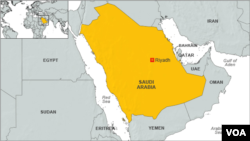A new Islamic State affiliate claimed responsibility Thursday for killing 15 people in a suicide bombing at a Saudi mosque used by security forces.
The group calling itself "The Hijaz Province of the Islamic State" said it carried out the attack. It made the claim in a Twitter statement hours after a suicide bomber detonated the explosive as worshippers prayed at the mosque in the southern city of Abha. The city is close to Saudi Arabia's southern border with war-torn Yemen.
The U.N. Security Council issued a statement condemning the terrorist attack "in the strongest terms." The members of the Security Council stressed again that the Islamic State group must be defeated and that the intolerance, violence and hatred it espouses must be stamped out.
The Hijaz Province statement said the group targeted a "monument of the apostate." Hijaz is a reference to the western part of Saudi Arabia, home to Islam's two holiest sites in Mecca and Medina.
The group vowed to launch more strikes against "tyrants in the Arabian peninsula...in the coming days."
Twelve of those killed at Abha were trainees with the country's Special Weapons and Tactics unit, tasked with domestic security, while three others were workers at the compound. Seven other people were wounded in the blast.
An Interior Ministry spokesman said the initial investigation pointed to the attack being carried out by a suicide bomber wearing an explosive vest. The Hijaz Province statement identified him with the nom de guerre "Abu Sinan al-Najdi," which indicates he lived in Saudi Arabia's Najd region.
Islamic State affiliates have claimed responsibility for several deadly attacks in recent months against police at checkpoints in the capital, Riyadh, and for slaughtering members of the kingdom's Shi'ite community.
The Saudi press agency said the governor of Asir province, Prince Faisal bin Khaled bin Abdel Aziz, visited the site of the attack and the wounded in a hospital. He condemned the attack, saying it was "aimed at destabilizing the country and sowing fear among citizens."





